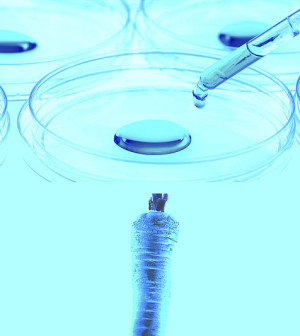- Recognizing the Signs of Hypothyroidism
- 10 Strategies to Overcome Insomnia
- Could Artificial Sweeteners Be Aging the Brain Faster?
- Techniques for Soothing Your Nervous System
- Does the Water in Your House Smell Funny? Here’s Why
- Can a Daily Dose of Apple Cider Vinegar Actually Aid Weight Loss?
- 6 Health Beverages That Can Actually Spike Your Blood Sugar
- Treatment Options for Social Anxiety Disorder
- Understanding the Connection Between Anxiety and Depression
- How Daily Prunes Can Influence Cholesterol and Inflammation
FDA Approves Genetic Test That Helps Explain Developmental Problems in Kids


The U.S. Food and Drug Administration approved on Friday a first-of-its-kind blood test that can scan a child’s genetic code and spot possible genetic explanations for developmental delays or intellectual disabilities.
The test can identify variations in chromosomes that are linked to such disorders as Down syndrome, DiGeorge syndrome and other developmental disabilities, the FDA said in a news release.
“This test is going to provide an additional diagnostic tool for treatment of children with identified developmental problems and disabilities,” said Dr. Annemarie Stroustrup, an assistant professor of pediatrics and newborn medicine at Mount Sinai Hospital in New York City.
It could speed up the diagnosis of these problems, “which could open the door for better and more targeted treatment,” Stroustrup said. “It will also give families a more accurate prognosis for children who have genetic causes for their developmental disability.”
Stroustrup stressed, however, that the test isn’t a screening tool to predict the future mental ability of a child. “It would be unethical to use it that way,” she said.
“It’s more of a diagnostic test for children who have pre-existing problems,” Stroustrup said. Parents should wait until the child is a toddler and showing signs of developmental problems before considering this test, she added.
The test, called CytoScan Dx, analyzes a child’s entire genome, the FDA said in the statement. Affymetrix Inc., based in Santa Clara, Calif., manufactures the test.
The FDA cautioned, however, that “the test results should only be used in conjunction with other clinical and diagnostic findings.”
This recommendation is the most important part of Friday’s announcement, said Rahil Briggs, director of Pediatric Behavioral Health Services at Montefiore Medical Center in New York City.
“I support all innovations that can reliably aid our ability to make accurate diagnoses, leading to appropriate interventions,” Briggs said.
“However, any diagnosis of developmental delay requires multiple sources of information, including clinical observation by a trained professional,” Briggs added.
Between 2 percent and 3 percent of U.S. children have some type of intellectual disability. Many of these disabilities, such as Down syndrome and DiGeorge Syndrome, are associated with chromosomal variations, according to the U.S. National Institutes of Health and the American Academy of Pediatrics.
In approving the test, the FDA found that the screen could “adequately” detect chromosome variations in areas of genetic code linked with intellectual and developmental disabilities.
The agency also compared the new test with existing tests commonly used for identifying a particular developmental delay or intellectual disability. That comparison showed that the new test was better at spotting certain chromosomal abnormalities.
Dr. David Mendez, a neonatologist at Miami Children’s Hospital, advised parents to be cautious about having such a test.
“Any genetic testing you do of your child has to be in consultation with a pediatric geneticist,” he said.
Mendez said he’d also restrict the test to children who already show signs of a developmental problem.
More information
Visit the U.S. Centers for Disease Control and Prevention for more on child development.
Source: HealthDay
Copyright © 2026 HealthDay. All rights reserved.










